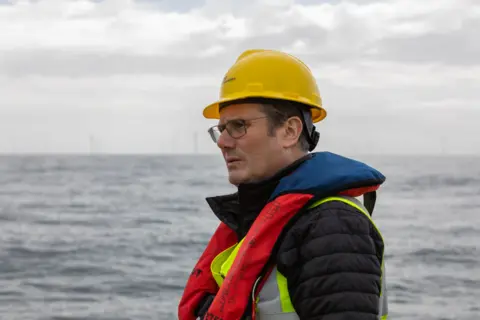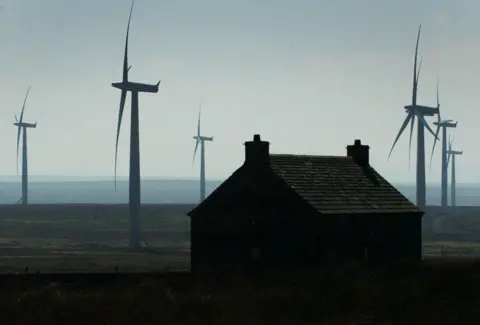Great British Energy: What does it mean for Scotland and Aberdeen?

 Getty Images
Getty ImagesThe UK government has confirmed that Aberdeen is to be the home of the new state-owned energy company.
Prime Minister Sir Keir Starmer has told the Labour conference in Liverpool that Great British Energy will operate out of the city.
It will not supply power to homes, but will help fund new and existing clean technology, as well as small and medium-sized renewable energy projects.
The government had been criticised for delays in announcing the company would be headquartered in Aberdeen but Sir Keir said it would be led by the “talent and skills of the working people in the Granite City”.
Great British Energy was one of Labour’s key election pledges and was always planned to be based in Scotland.
BBC Scotland news revealed earlier this month that the decision had been taken to base the company in the UK’s oil and gas capital.
The company chairman, Juergen Maier, has now confirmed it will also operate sites in Glasgow and Edinburgh.
But there has been some confusion over what exactly it was designed to do, which forced Labour to clarify its role during the election campaign.
Tuesday’s announcement means industry and consumers are a step closer to knowing what its creation will mean for the UK’s energy future.
What is Great British Energy?
Ed Miliband, the UK’s energy security and net zero secretary, has said the company will help “to make Britain a clean-energy superpower, with a fully decarbonised power system by 2030.”
He describes GB Energy as “a new national champion allowing us to reap the benefits of Britain’s abundant natural resources, with clean power projects in communities across our country, to create the next generation of good jobs, reindustrialising Britain.”
The government has published five key functions for the company:
- Project development – leading projects through development stages to speed up their delivery, whilst capturing more value for the British public
- Project investment – investing in energy projects alongside the private sector, helping get them off the ground
- Local Power Plan – supporting local energy generation projects through working with local authorities, combined authorities and communities
- Supply chains – building supply chains across the UK, boosting energy independence and creating jobs
- Great British Nuclear – exploring how Great British Energy and Great British Nuclear will work together, including considering how Great British Nuclear functions will fit with Great British Energy.
Its founding statement says: “Great British Energy will own, manage and operate clean power projects. It will be a company that will generate energy in its own right, working in partnership with the private sector for the good of the country.”
 PA Media
PA MediaGB Energy has launched a partnership with The Crown Estate, the statutory corporation which runs the £16bn portfolio of land and seabed belonging to the monarch.
The government believes this will cut through the long time-scales currently experienced when trying to get large infrastructure projects such as wind farms and transmission lines built.
The Crown Estate estimates this partnership will lead to up to 20-30GW of new offshore wind developments reaching seabed lease stage by 2030, which it says is enough to power the equivalent of almost 20 million homes.
Ministers also claim the deal “has the potential to leverage up to £60bn of private investment into the UK’s drive for energy independence.”
How will Great British Energy be funded?
The government has pledged to invest £8.3bn of new money into the company over the course of this parliament.
That is expected to be raised through a windfall tax on oil and gas firms.
The party had said previously it would not issue new oil and gas licences but also said it would not overturn existing permits.
The company will be independently operated and any profits will be reinvested, meaning it will be self-funding as soon as is possible.
What does Great British Energy mean for Aberdeen?
The confirmation that Aberdeen was to be the home of GB Energy came wrapped in praise from the prime minister at his speech in Liverpool.
“We said, GB Energy, our publicly owned national champion, the vehicle that will drive forward our mission on clean energy, we said it belonged in Scotland, and it does,” he said.
“But the truth is, it could only really ever be based in one place in Scotland.
“So today, I can confirm that the future of British energy will be powered as it has been for decades, by the talent and skills of the working people in the Granite City with GB Energy based in Aberdeen.”
That brings to an end months of speculation though the debate will now turn to what that will actually mean for jobs and infrastructre in the city, which faces a tricky transition from oil and gas to renewable energy.
The SNP and Conservatives have claimed that up to 100,000 jobs could be at threat from Labour policy on oil and gas licences.
However, the industry estimates the total Scottish jobs dependent on the sector is 60,000.
Tuesday’s announcement brought no further details on how many jobs would be created by GB Energy.
 Getty Images
Getty ImagesRussell Borthwick, chief executive at Aberdeen and Grampian Chamber of Commerce, said it would secure the north-east’s status as a “global energy capital” for many decades to come.
“We are home to over 1,000 energy supply chain companies and the lion’s share of energy workers who stand ready to deliver the UK’s transition to net zero,” he said.
“With the people, skills, strategic infrastructure and future pipeline of projects already in place, the north-east of Scotland is ready to lead the way.
“However, we do not need to kill off one industry to grow another – in fact, the opposite is true, as one cannot exist without the other.”
“We therefore urge the UK government to use next month’s Budget to restore confidence in the North Sea to protect the jobs, supply chain and energy production we need to ensure a just transition.”
However, Scottish Green MSP Maggie Chapman said there were still more questions than answers.
“GB Energy should be an organisation that resources the energy sector’s move towards genuine renewable energy, not an excuse for more warm words on oil, gas and nuclear,” she said.
SNP Westminster leader Stephen Flynn said the prime minister needed to “get down to the business of explaining how GB Energy will bring down energy bills”.
Scottish Conservative MSP Douglas Lumsden said the announcement would do “almost nothing to compensate for the hammer blow Labour’s policies on oil and gas have already delivered to the north east”.
What will Great British Energy mean for my bills?
GB Energy will not immediately cut bills for consumers, as the global energy market continues to deal with the problems caused by the war in Ukraine.
The decision to restrict winter fuel allowance makes this a tricky area for Labour.
But ministers are keen to stress this is the first part of changing the way Britain sources, manages and modernises its energy sector.
To work, GB Energy will have to transition the oil and gas sector to renewables, redesign how the grid operates, deliver green energy directly into homes and end the UK’s reliance on foreign energy.
Ed Miliband has said: “In an unstable world, the only way to guarantee our energy security and protect billpayers permanently is to speed up the transition away from fossil fuels and towards home‑grown clean energy.”
 PA Media
PA MediaGas and electricity prices will rise by 10% in England, Scotland and Wales from October.
Under the new energy price cap, the typical annual dual-fuel bill paid by direct debit will be £1,717 per year.
At the same time, more then 10 million pensioners will no longer get winter fuel payments to help them with bills at the coldest time of year.
Related
Why investing in women is a vital next step for…
Get Nadine White's Race Report newsletter for a fresh perspective on the week's newsGet our free newsletter from The Independent's Race CorrespondentGet our fre
Business secretary signals major shift on electric car policy to…
In a determined effort to retain Nissan’s manufacturing presence in Britain, Business Secretary Jonathan Reynolds has vowed to implement “substantial c
Joint Statement: Business Secretary and Fujitsu Services Ltd
Business and Trade Secretary Jonathan Reynolds today (Friday 7 March) met chiefs for Fujitsu in Tokyo to begin talks over the cost of redress for victims of th
UK foreign secretary backs multilateral defence funding for Europe
UK foreign secretary David Lammy has said that a new multilateral fund will be needed to secure Europe’s defence as he confirmed that Britain is “open to”














